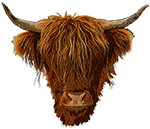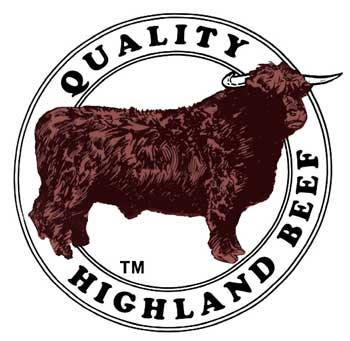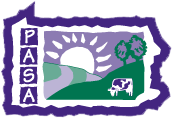Our High Standards
American Highland Cattle Association
Pittsburgher Highland Farm is a member of the American Highland Cattle Association. We are certified by their Quality Highland Beef (QHB) program which provides recommendations and guidelines to ensure the health of the animals and the environment. If you'd like to read more about Quality Highland Beef, click here.
Pittsburgher Highland Farm adheres strictly to both of these USDA standards:
Grass (Forage) Fed Marketing Claim Standard
Grass (Forage) Fed – Grass and forage shall be the feed source consumed for the lifetime of the ruminant animal, with the exception of milk consumed prior to weaning. The diet shall be derived solely from forage consisting of grass (annual and perennial), forbs (e.g., legumes, Brassica), browse, or cereal grain crops in the vegetative (pre-grain) state. Animals cannot be fed grain or grain byproducts and must have continuous access to pasture during the growing season. Hay, haylage, baleage, silage, crop residue without grain, and other roughage sources may also be included as acceptable feed sources. Routine mineral and vitamin supplementation may also be included in the feeding regimen. If incidental supplementation occurs due to inadvertent exposure to non-forage feedstuffs or to ensure the animal’s well being at all times during adverse environmental or physical conditions, the producer must fully document (e.g., receipts, ingredients, and tear tags) the supplementation that occurs including the amount, the frequency, and the supplements provided.
Grass (Forage) Fed Marketing Claim Standard (October 16, 2007, Federal Register Notice (72 FR 58631)) - PDF
"Naturally Raised" Marketing Claim Standard:
Naturally Raised – Livestock used for the production of meat and meat products that have been raised entirely without growth promotants, antibiotics (except for ionophores used as coccidiostats for parasite control), and have never been fed animal (mammalian, avian, or aquatic) by-products derived from the slaughter/harvest processes, including meat and fat, animal waste materials (e.g., manure and litter), and aquatic by-products (e.g., fishmeal and fish oil). All products labeled with a naturally raised marketing claim must incorporate information explicitly stating that animals have been raised in a manner that meets the following conditions: 1) no growth promotants were administered to the animals; 2) no antibiotics (other than ionophores used to prevent parasitism) were administered to the animal; and 3) no animal by-products were fed to the animals. If ionophores used only to prevent parasitism were administered to the animals, they may be labeled with the naturally raised marketing claims if that fact is explicitly noted.
Naturally Raised Marketing Claim Standard (January 21, 2009, Federal Register Notice (74 FR 3541) – PDF
JOIN OUR EMAIL LIST


